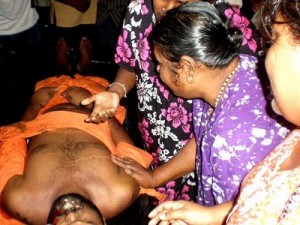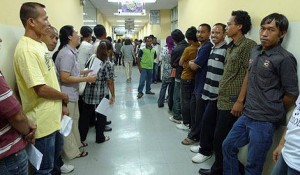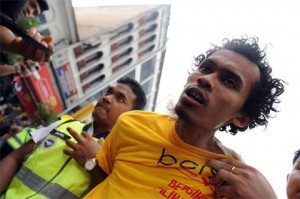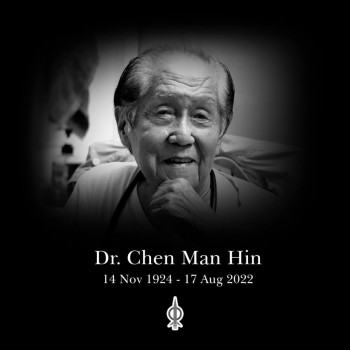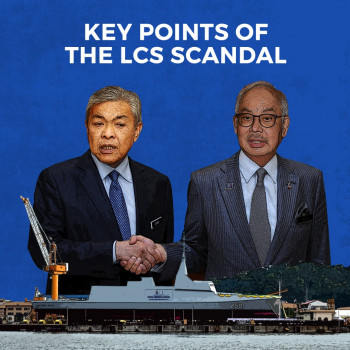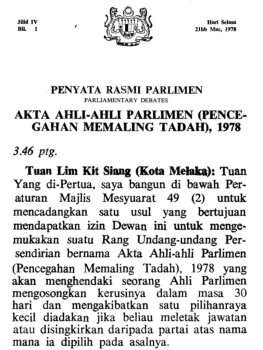Last year, 25 people were killed in police shootings and 10 died in custody, said NGO Suaram during the launch of its Human Rights Report 2011. This shocking statistic shows an increase from the year before, begging the question, “who watches the watchmen?”
Any single death under the watch of a law enforcement agency, is one death too many.
In 2009, the Royal Commission to Enhance the Operation and Management of the Royal Malaysian Police suggested the formation of an Independent Police Complaints and Misconduct Commission.
This was not implemented. Instead, the Enforcement Agency Integrity Commission (“EAIC”) was established in its place. The EAIC has only received 170 cases so far, despite having 19 enforcement agencies under its purview. A solution to end police’s abuse of powers is yet to be seen.
Meanwhile, other law enforcement agencies records are far from stellar, with the Malaysian Anti-Corruption Commission having at least two high profile custodial deaths as a blight on its short two year formation. The latest case, Ahmad Sarbaini, which took place in 2011, is still pending investigation.
Barrage of unconstitutional legislation
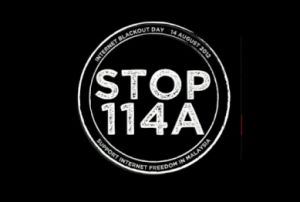 The Human Rights Report 2011 highlighted the low points in Malaysia’s dismal civil and political rights records throughout the year.
The Human Rights Report 2011 highlighted the low points in Malaysia’s dismal civil and political rights records throughout the year.
As a barometer, Suaram pointed out the recent “barrage of unconstitutional legislation” that empowered to government to abuse, deny and restrict human rights. These amendments to our laws were instead packaged as “reforms”, while in fact, the implementation was “least desirable for human rights and civil liberties”, according to Suaram.
“The changes made by the government were aimed at legalising government’s powers over its people and falsely promote the government’s compassion towards human rights and civil liberties”.
Although the Internal Security Act 1960 was abolished, 30 individuals who were detained under the act have yet to be released. Worse still, 13 more individuals from Sabah were detained without trial, after the act was repealed.
Even more worrying was the enactment of the new Security Offences (Special Measuress) Act, widely regarded as the “new ISA” with wide-ranging powers to enable detention without trial and even an electronic monitoring device for released detainees.
While the condition of police permit for gatherings (required under section 27 of the Police Act 1967) has been removed, this was replaced with the hastily enacted Peaceful Assembly Act 2012 (PAA). The restrictions and requirements of the PAA are so wide that it even considered daily activities like weddings receptions, funeral processions, religious assemblies, and open houses.
The Printing Presses and Publications Act requirement of annual renewal for printing permits has been removed. Ironically, the Home Minister retains the final say to suspend or revoke newspaper licenses. Further, the new section 114A amendment to the Evidence Act 1950 has led to an absurd result of “guilty until proven innocent” for online users.
Refugee treatment falls short of international standards
Malaysia’s botched refugee swap deal with Australia made international headlines mainly because of its non-compliance with United Nations conventions and protocols. The abortive refugee swap plan was heavily criticised by the international community.
Suaram also highlighted the government’s crackdown in conjunction with its Comprehensive Legalisation Programme for Illegal Immigrants (6P), calling it a practice of “immigrant cleansing”.
Suaram said that the 6P program was an attempt to circumvent international standards pertaining to protection of refugees, asylum seekers and undocumented migrants. This was because the program failed to distinguish between these three types of persons.
Malaysia is obligated to adhere to the international customary law of non-refoulement which prohibits the return of people to places where they may face persecution or threats to their life or freedoms.
Racism on the Rise
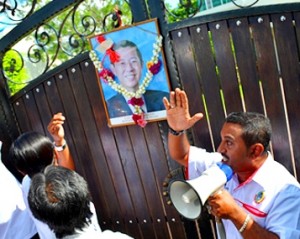
Perkasa members staging a protest involving mock funeral rites for a photograph of Penang Chief Minister Lim Guan Eng
2011 saw demonstrations and violent protests colored with racist slants by far-right groups. Among these were supporters from Perkasa, Suara Anak Anak Mamak Pulau Pinang, and Pertubuhan Kebajikan Sejati Malaysia.
These groups demanded the resignation of Penang Chief Minister Lim Guan Eng, Komtar assemblyman Ng Wei Aik, condemnation of Bersih 2.0 and a motorcycle race track.
In schools, instances of teachers and head teachers expressing racist and racial slurs continued to be documented.
Malaysia has yet to ratify the International Convention for the Elimination of Racial Discrimination convention, which had been ratified by 175 countries.
Freedoms restricted
As far as Malaysian fundamental freedoms are concerned, Suaram called the situation “bleak and hopeless”.
1,667 persons were arrested for the Bersih 2.0 gathering in 2011, and 262 tear gas shells were fired. The government has also initiated legal action against the Bersih 2.0 steering committee for damage against public property.
The Malacca Chinese Assembly Hall was deregistered, the Malaysian Medical Association was struck off the registrar of societies (ROS). Meanwhile, ROS refused the application by the Human Rights Party to be registered as a political party.
International Islamic University suspended its law lecturer Dr Abdul Aziz Bari for his comments regarding the Sultan of Selangor’s pronouncement on a raid by the Selangor Islamic Affairs Department on a church.
On 22nd July 2011, French human rights lawyer, William Bourdon was deported. He was in Malaysia to brief his client Suaram in relation to the Scorpene case.
On 12th August 2011, British lawyer Imran Khan was deported. He was in Malaysia on a fact finding mission regarding Hindraf’s class action suit against the UK government.
During the 2011 Sarawak State Election, several activists and Bersih steering committee members were barred from entering the state.
In March 2011, controversy arose over the stamping of 5,100 Malay language bibles with the words “For Christians Only” on the covers.
In May 2011, Utusan Malaysia alleged that DAP was involved in a plot to make Christianity the official religion of Malaysia. Following this allegation, Perkasa chief Ibrahim Ali, threatened violence against Christians. Minister Nazri Aziz said no action would be taken against Ali, because this would be stifling his freedom of speech. – The Rocket

